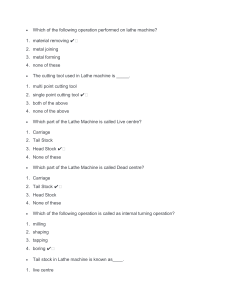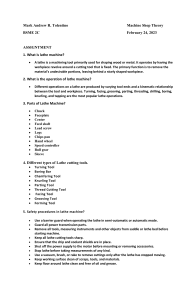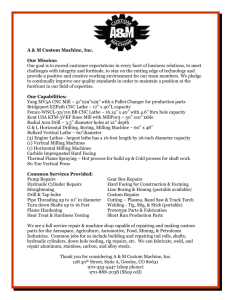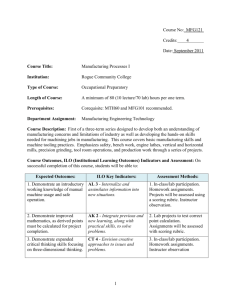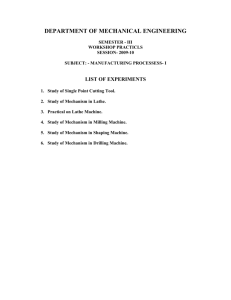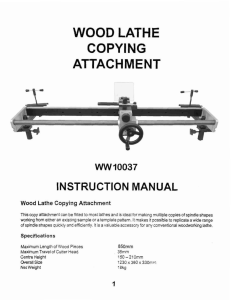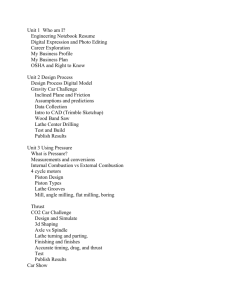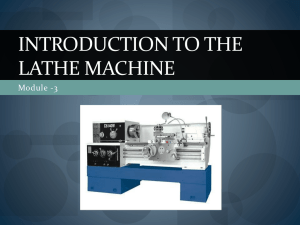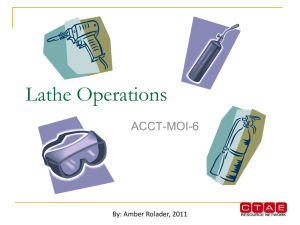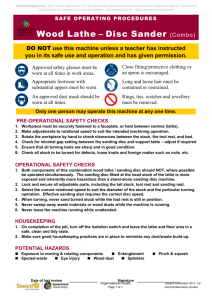Mechanical Engineering and History lathe
advertisement
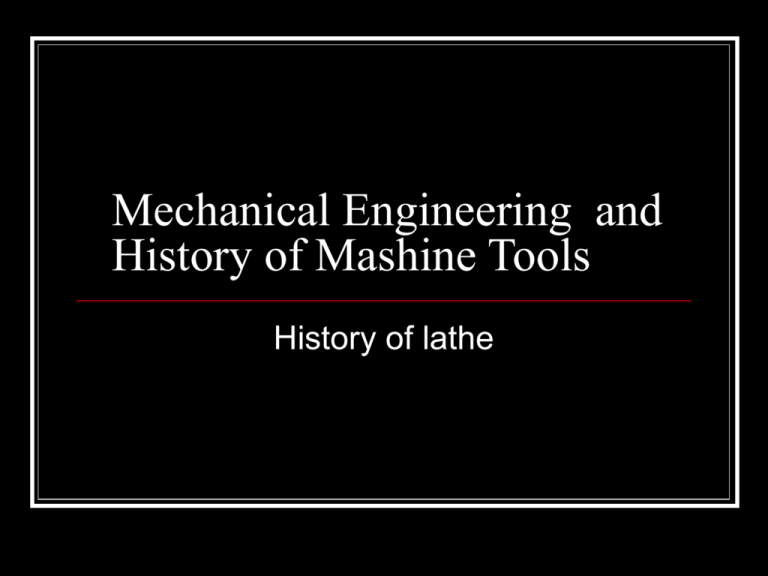
Mechanical Engineering and History of Mashine Tools History of lathe Mechanical Engineering Mechanical Engineering is heavy industry, which produces all kinds of machinery, tools, appliances, consumer goods and defense products. Branches of engineering in groups Mechanical engineering is divided into two groups&: labor-intensive and metal Branches of engineering General Engineering Heavy engineering Medium Machine Building Heavy engineering *Conveying machinery *Railway engineering *Shipbuilding *Aerospace Industry *The space industry *Power plant *The production of technological equipment *Agricultural Machinery Industry Medium Machine Building * Automotive * Tractor * Machine tools *Robotics * Tool-making industry * Equipment for light industry * Food industry equipment *Industry of household appliances and cars Precision engineering * Instrument * Radio Engineering and Electronics Industry * Electrical Industry Machine-tool world World production of machine tools made at the end of 1990 more than 1.2 million units. Once being the world machine tool industry, Ukraine has practically lost the industry. Currently, the production machine tool products distinguished: 1) Japan (200 thousand pcs.) 2) China (150 thousand units.) History of lathe In the middle of the XVI Jacques Besson (who died in 1569) invented a lathe for slicing the cylindrical and conical screws. Andrei Konstantinovich Nartov (1693-1756) At the beginning of XVIII century, Andrei Konstantinovich Nartov (1693-1756) invented the original screw-cutting lathe and copier with mechanized carriage and a set of replacement gears. To untruly understand the global significance of these inventions, will return to the evolution of lathe. XVIII century At the beginning of the XVIII century lathes are increasingly used for cutting metal, not wood, and therefore the problem of hard attaching the cutter and move it along machined surface of the table is very important. And now for the first time the problem self-propelled carriage was successfully accomplished in Mortisers A.K Nartova A.K Nartov The second half of the XVIII century the machine tool industry was marked by a sharp increase the scope of machine tools and a satisfactory scheme universal lathe that could be used in various purposes. 1718-1729 A. Nartov not only solved the problem of mechanization of this operation, but in the years 1718-1729 he perfected the scheme of the photocopier finger and brought into the caliper movement of a spindle, but with a different step by cutting the bit and under copier. 1751 In 1751 M. Vokanson France built the machine, which according to its Technical data is like a universal. It was made of metal, had a strong stand, two metal centers, two V-shaped guides form, copper slide, providing mechanized movement tool in the longitudinal and transverse directions. French engineer Hay In 1795, French engineer Hay produced a specialized lathe machine for cutting screws. Designer provided a removable gear, large lead screw, a simple mechanized support. Created a screw-cutting lathe with a mechanized carriage (1797), mechanized production of screws, nuts, etc. The early years were spent in Woolwich near London. Mawdsley Henry (1771-1831) ► English engineer and industrialist Mr. Mawdsley In 1800, Mr. Mawdsley perfected this machine and then created a third version contained all the elements that have screw-cutting lathes today. In 1835, the D. Whitworth invented the automatic feeding in the transverse direction which was associated with the mechanism of the longitudinal feed. This was completed fundamental improvement of the turning equipment nineteenth century In the second half of the nineteenth century. quality of American machinery was already high. Machines produced in series, and enter the full interchangeability of parts and units produced by one firm. In case of breakage parts was enough to write with a similar plant, and replace broken detail on the whole, without any adjustment. XIX century In the second half of the nineteenth century elements to ensure complete mechanization block ADF in both coordinates, perfect system of fixing the tool and parts were introduced. S. Fitch S. Fitch in 1845 designed and built a turret lathe eight cutting tools in the turret. Speed of change tools dramatically increased the productivity of the machine in the manufacture of serial production. It was a big step toward the creation of automatic machines. Chr. Spencer The first universal lathe machine invented in 1873 by Chr. Spencer. Since the beginning of the XIX century began a gradual revolution in mechanical engineering. In place old lathe, one after another come to new high automatic machines equipped with calipers. The beginning of this revolution put lathe cutting lathe English mechanics Henry Maudsley, which allowed automatically grind the screws and bolts from any thread.
